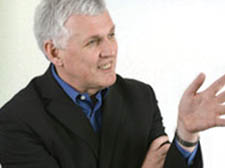|
|
 |
| |

In: businessman Jow Liddane |
Night of the long scalpels as hospital ousts chief
Chairman who steered Whittington to two-star status is replaced by businessman
ONE of the key figures at Whittington Hospital in Highgate – its chairman Narendra Makanji – has been dramatically forced to stand down following heated internal rows.
The removal of the Labour left-winger after four years is being seen as a major blow to those who fight to keep the NHS publicly funded.
Mr Makanji, 56, is being replaced by Joe Liddane, a former management consultant with Ernst & Young, one of the largest professional services firms in the world.
Moves against Mr Makanji were made by his vice-chairman, Peter Farmer, who is a former European director with Ernst & Young. In May this year Mr Farmer sent a letter highly critical of Mr Makanji to Sir George Green, chairman of the London Strategic Health Authority.
Mr Farmer even gave a copy of his letter – suggesting the chairman did not have the required leadership skills as the hospital prepares to bid for foundation status – to Mr Makanji.
The letter was passed to the Government Appointments Commission, which announced on Wednesday that Mr Makanji is to be replaced by Mr Liddane.
Mr Makanji said: “I have been told that my skills, which were good for the last four years, are no longer appropriate in the run-up to the foundation trust.
“It appears they are now looking for people with business and corporate skills. But I believe the key skills needed for a foundation hospital are ones that embrace the community rather than seek a profit at the expense of the NHS.”
A former Labour councillor in Haringey, he has won recognition for the way he helped steer the former crisis-hit hospital to its current two-star status.
With a recently-opened private ward, the hospital is now seeking foundation status within the next five months, which could involve more privatisation.
Former Health Secretary Frank Dobson, Labour MP for St Pancras and Holborn, was impressed with Mr Makanji’s chairmanship. “People have to bear in mind that the Whittington is not the most privileged hospital in London,” he said.
“He went out of his way to reflect the views of patients at local level. They will have to do well to improve on him.”
Islington North Labour MP Jeremy Corbyn expressed disappointment at Mr Makanji’s departure. “It looks very much like Narendra was removed because of his belief in the NHS,” he said.
“He has done a great job at the hospital. It regularly gets good reports, and he should be recognised for that.
“And he is fully committed to the principle of public service rather than the private provision of public services.
“Other hospital chairpersons have been re-appointed without any discussion at all. It is very sad and disappointing for everyone.”
Mr Makanji was paid £20,000 a year for the three-day post, which he described as virtually a full-time job. In his letter to the London Strategic Health Authority, Mr Farmer wrote that he thought Mr Makanji had many skills but added: “I do not believe they are the ones now required to take the trust in the new environment where firm leadership and clear vision are vital.”
Mr Farmer said the re-appointment of Mr Makanji would be “detrimental to our hopes of achieving foundation status and not in the best interests of the Whittington”.
Mr Makanji said he had fallen out with management over a proposal to sell Waterloo building on Highgate Hill, the now-empty former mental health unit.
“I would have preferred it was kept for possible reuse by the hospital,” he said.
He warned that the hospital could be about to introduce more independent sector treatment. “This would allow private companies to tender for primary care and speciality services. It would undermine the NHS,” he said.
He is concerned about the long-term future of the popular hospital.
“If the Whittington doesn’t become a fully-fledged foundation hospital in its own right then I believe it could be taken over by a neighbouring trust, possibly the Royal Free,” Mr Makanji said.
Hospital chief executive David Sloman said: “Narendra has served the Whittington with dedication and commitment for which we thank him warmly, and wish him well in all his future endeavours.”
‘My fears over MRSA’
IN the wake of his departure, Narendra Makanji has revealed how he was concerned over the way the hospital tackles the deadly bug MRSA.
He said: “I know numbers of infections are improving but I felt insufficient work was being done. I kept pressing with particular senior management that we must tackle MRSA head on. But I was told that, as chairman, I should stick to strategy.”
Mr Makanji, a former member of Camden Community Relations Council, accuses the top echelons of the NHS of “institutionalised racism”.
“I’m only one of six or seven chairs from the ethnic community out of 80 NHS trusts across London,” he said. “There is only one other member of the Whittington trust board who is from the ethnic communities.”
A spokeswoman for the hospital denied that insufficient work was being done to combat MRSA. “We have one of the best records nationally for dealing with the problem,” she added.
On the claims of institutionalised racism at the top, Whittington director of strategy, Susan Sorenson, said she was aware that the board may not be fully representative of the ethnic communities. “I’m glad this has been brought to our attention and hope that the situation can be improved,” she added. |
 |
|
|
 |
|
 |
|